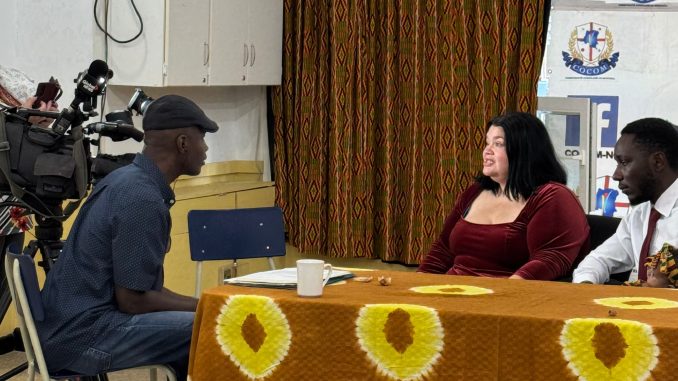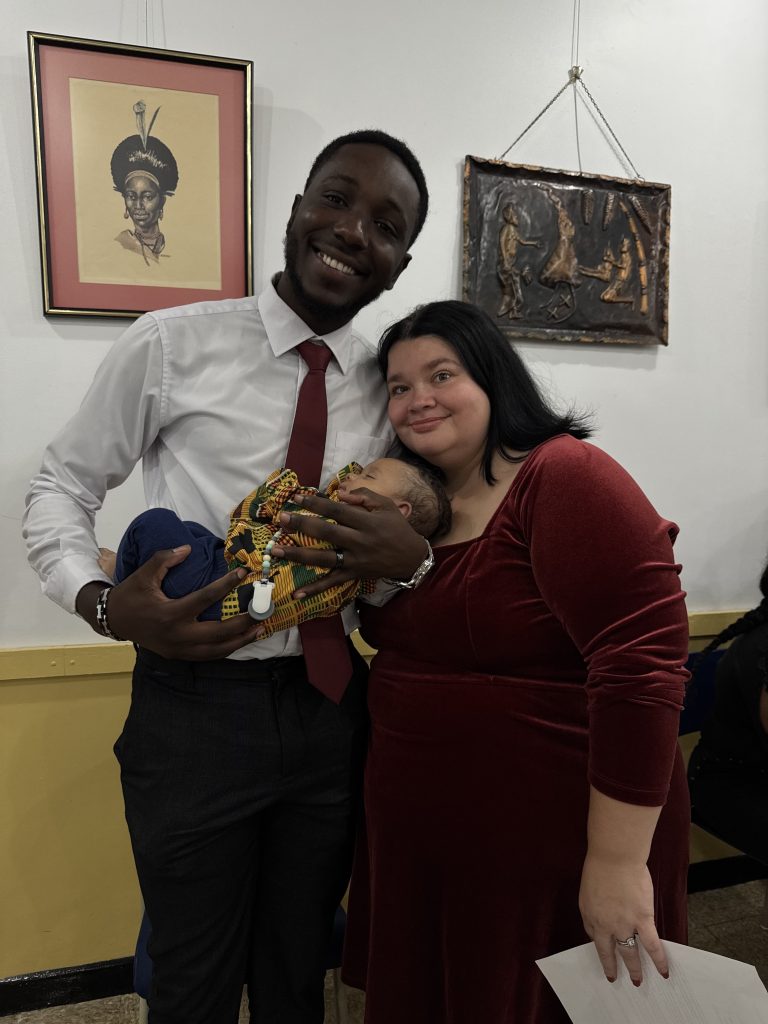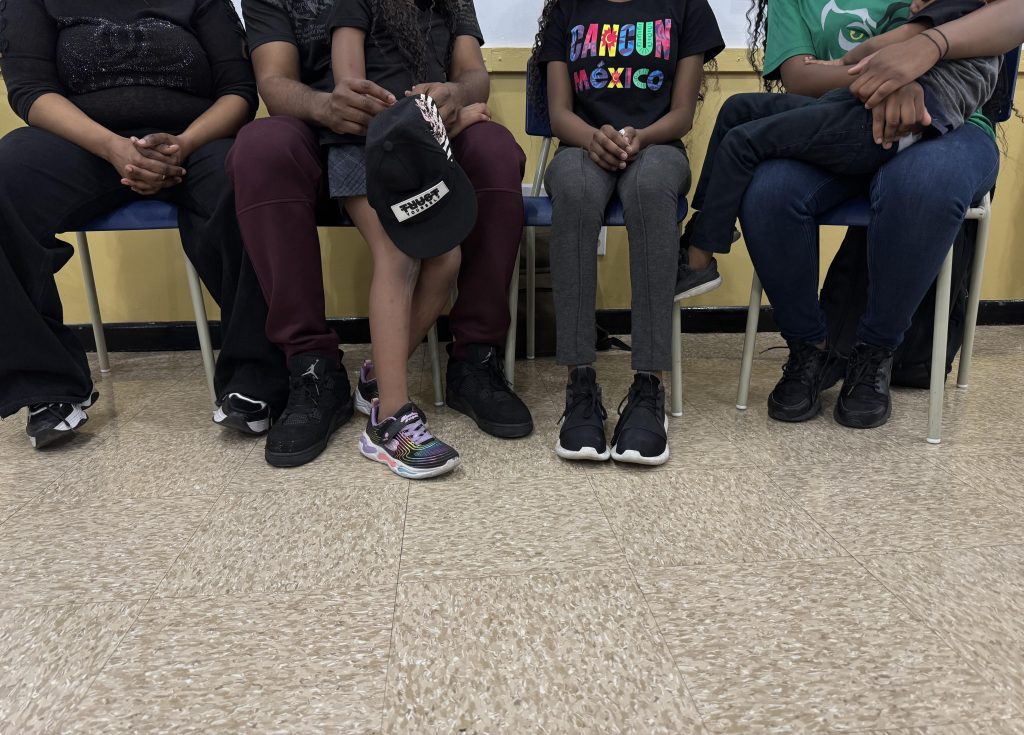
By Oumou Diakité and Colin McGregor
Montreal – An autumn morning in 2025, September 2nd: At the Centre Afrika in downtown Montreal, the curtains filter brilliant rays of sunshine, in stark contrast to the dour mood of the moment. In this improvised press conference room, cameras film, pens scratch out on notepads, footsteps fall heavily on the tile floor, and reassuring whispers fill the hall. A little refreshment table has been set up at the back end of the room, but no one is touching the treats. We all know why we are there. The heart of the matter: two fathers of Canadian families are being threatened with deportation, leaving behind them children in tears and befuddled, lost wives. For the Congolese community in Montreal, it’s more than an affair of these two individuals: it’s the symbol of a blind, inhuman immigration system.
Jonas Kiese Umba, Survivor and New Father
Married to Fannie Séguin since March 2024, Jonas, 28 years of age, is the father of little Kimia, born this past May. His story begins in Kinshasa, the enormous capital of the Democratic Republic of the Congo (DRC), where he participated in peaceful demonstrations against the illegal maintenance in power of dictator Joseph Kabila.

“The bullets spoke more loudly than our cries,” Jonas recalls, evoking police repression. His father decided to send him to Quebec to offer him a better future.
Settling in Saint-Hyacinthe, Jonas took journeyman jobs, learned French, and discovered what he calls “the Quebec spirit.” “I adopted the dialogue, the ethos of living together. I wasn’t just an immigrant, I became a citizen in my soul,” he confides, his voice trembling.
But in March of this year, a bleak message: a deportation order. On September 10th he would have to return to the DRC, which the government of Canada deems a safe country despite its current war and genocide.
His immigration lawyer, Stewart Istvanffy, denounces a “tragic error of judgment.” According to him, Ottawa confuses the Bundu Dia Mayala movement (BDM), a legal and pacifist political party, with a “subversive” organization. “We’re breaking up a family over an administrative error,” the lawyer contends.
Cristiano Bindo Nguya, an Indispensable Father
Cristiano has lived in Drummondville since 2015, a discreet man from Angola whose life was ruled by work and his frequent trips to the Ste-Justine Hospital. Father of four children born in Canada, he regularly accompanies his young son stricken with sickle cell anemia, a grave hereditary ailment that can be fatal without constant treatment.
“If I leave who will accompany him to hospital?” asks the father, out of breath. “Who will be there for him?”

In November of 2022, Cristiano escaped deportation once thanks to a temporary permit. His request for permanent residency was never approved. And on September 5th, a Friday, he left for Angola, one of Africa’s most repressive countries according to international agencies.
His wife, Nike Sangi Luyindamo, herself threatened with deportation for having participated in demonstrations against Kabila, collapses when discussing her children’s future. “They don’t eat, they don’t sleep, and their school results are in freefall.”
How do you tell your children that they’re going to lose their father because the system has decided it?
A Community in Shock
Papy Omgona Lunge, president of the Congolese Community of Greater Montreal (COCOM), speaks before the media. “We’re talking about honest fathers who work hard and pay their taxes. Yet we treat them like threats. These expulsions traumatize their children and make the whole community more fragile.”
Lunge’s organization represents 40,000 Congolese Montrealers. For him the social consequences of these deportations are serious: school dropouts, psychological issues, risks of joining gangs. “You can’t replace a father. These children are Canada’s future.”
Carine Masita, a member of the board of COCOM, is indignant. “We’ve become ashamed to ask for asylum. Our compatriots aren’t criminals, they’re good citizens that make Canada stronger.” She promises petitions, demonstrations, and further mobilization.
A Judicial and Political Battle
The lawyers at the press conference denounced a “campaign of deportations” taking place without transparency. Mr. Istvanffy says: “It’s a trend. They’re deporting all sorts of people to anywhere and everywhere.” He accuses Ottawa of ignoring its international obligations as well as the Charter of Rights. “These children are Canadian citizens. They have the right to live with their father.”
The situation is hard to nail down politically. Louise Gagné, a militant involved in the file, says she has lobbied the relative federal members of parliament, including ministers. “Some back away, others say it doesn’t concern them. But how could it not concern elected officials, when entire families risk being destroyed?”
A Silent Plague
The cases of Jonas and Cristiano are by no means isolated. According to those active in the file, dozens of Congolese are being threatened in the same way. Human rights campaigners denounce “systemic discrimination” that disproportionately targets Canada’s Congolese community.
At the Centre Afrika, looks are exchanged; voices break. Fannie Séguin watcher her own mother hug little Kimia tightly, then tenderly looks at Jonas’ and Nike’s four children. She understands what they are going through.
At the end of the press conference, when onlookers can get up and talk to the participants, Mrs. Séguin confides, “I am torn. Following my husband means exposing my daughter to a country Canada has advised people to avoid. Staying here without him condemns her to growing up without a father. I don’t know what to do.”
The lawyers want an immediate moratorium. Associations are phoning politicians, including the Minister of Immigration. But time is not on the side of the fathers. One has already left, leaving behind a broken family. The other has only days, indeed hours, left.
The question remains: What is a society worth that measures the protection of its borders with children’s tears?
Court Date
Mr. Stewart Istvanffy will be pleading for Jonas Umba Kiese to stay in Canada tomorrow, Tuesday, September 9 at 11 a.m. at the Federal Court (30 McGill Street, at the corner of La Commune Street). Interested members of the public are welcome.

Leave a Reply